|
|
|
Sort Order |
|
|
|
Items / Page
|
|
|
|
|
|
|
| Srl | Item |
| 1 |
ID:
105169
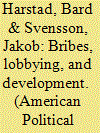

|
|
|
|
|
| Publication |
2011.
|
| Summary/Abstract |
When faced with a regulatory constraint, firms can either comply, bribe the regulator to get around the rule, or lobby the government to relax it. We analyze this choice, and its consequences, in a simple dynamic model. In equilibrium, when the level of development is low, firms are more inclined to bend the rule through bribery but they tend to switch to lobbying when the level of development is sufficiently high. Bribery, however, is associated with holdup problems, which discourage firms from investing. If the holdup problems are severe, firms will never invest enough to make lobbying worthwhile. The country may then be stuck in a poverty trap with bribery forever. The model can account for the common perception that bribery is relatively more common in poor countries, whereas lobbying is relatively more common in rich ones.
|
|
|
|
|
|
|
|
|
|
|
|
|
|
|
|
| 2 |
ID:
105182
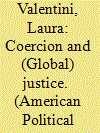

|
|
|
|
|
| Publication |
2011.
|
| Summary/Abstract |
In this article, I develop a new account of the liberal view that principles of justice (in general) are meant to justify state coercion, and consider its implications for the question of global socioeconomic justice (in particular). Although contemporary proponents of this view deny that principles of socioeconomic justice apply globally, on my newly developed account this conclusion is mistaken. I distinguish between two types of coercion, systemic and interactional, and argue that a plausible theory of global justice should contain principles justifying both. The justification of interactional coercion requires principles regulating interstate interference; that of systemic coercion requires principles of global socioeconomic justice. I argue that the proposed view not only helps us make progress in the debate on global justice, but also offers an independently compelling and systematic account of the function and conditions of applicability of justice.
|
|
|
|
|
|
|
|
|
|
|
|
|
|
|
|
| 3 |
ID:
105171


|
|
|
|
|
| Publication |
2011.
|
| Summary/Abstract |
Is electoral competition good for political selection? To address this issue, we introduce a theoretical model where ideological parties select and allocate high-valence (experts) and low-valence (party loyalists) candidates into electoral districts. Voters care about a national policy (e.g., party ideology) and the valence of their district's candidates. High-valence candidates are more costly for the parties to recruit. We show that parties compete by selecting and allocating good politicians to the most contestable districts. Empirical evidence on Italian members of parliament confirms this prediction: politicians with higher ex ante quality, measured by years of schooling, previous market income, and local government experience, are more likely to run in contestable districts. Indeed, despite being different on average, politicians belonging to opposite political coalitions converge to high-quality levels in close electoral races. Furthermore, politicians elected in contestable districts have fewer absences in parliament, due to a selection effect more than to reelection incentives.
|
|
|
|
|
|
|
|
|
|
|
|
|
|
|
|
| 4 |
ID:
105178


|
|
|
|
|
| Publication |
2011.
|
| Summary/Abstract |
Does globalization's impact on the labor market affect how people vote? I address this question using a new dataset based on plant-level data that measures the impact of foreign competition on the U.S. workforce over an 8-year period. Analyzing change in the president's vote share, I find that voters were substantially more sensitive to the loss of local jobs when it resulted from foreign competition, particularly from offshoring, than to job losses caused by other factors. Yet, I also find that between 2000 and 2004, the anti-incumbent effect of trade-related job losses was smaller in areas where the government certified more of the harmed workers to receive special job training and income assistance. The findings have implications for understanding the impact of international economic integration on voting behavior, as well as for assessing the electoral effect of government programs designed to compensate the losers from globalization.
|
|
|
|
|
|
|
|
|
|
|
|
|
|
|
|
| 5 |
ID:
105180
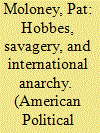

|
|
|
|
|
| Publication |
2011.
|
| Summary/Abstract |
This article argues that Hobbes constructed the sovereignty acknowledged among European states on the supposition of the absence of sovereignty in the New World. The notion of international anarchy found in Hobbes before the twentieth century was not the anarchy of interstate relations later posited by realism, but the anarchy of prepolitical societies outside the ordered system of European states. The modern geography of sovereignty that Hobbes established is demonstrated with reference to the cartographic traditions that informed his representation of the state of nature and the civil state, and to the historical context of the law of nations as it was understood to manage colonial rivalry in the seventeenth century. By constructing savages as absolutely free individuals in the state of nature, he precluded their recognition as free sovereign states. He thus contributed a set of premises to natural jurisprudence that denied indigenous societies statehood and excluded them from the family nations. A sketch of the Hobbesian legacy among theorists of the law of nations and international law is made, showing how his motif of savage anarchy remained central to our conceptualization of the sovereign state within the international realm into the twentieth century.
|
|
|
|
|
|
|
|
|
|
|
|
|
|
|
|
| 6 |
ID:
105174


|
|
|
|
|
| Publication |
2011.
|
| Summary/Abstract |
We report the results of the first large-scale experiment involving paid political advertising. During the opening months of a 2006 gubernatorial campaign, approximately $2 million of television and radio advertising on behalf of the incumbent candidate was deployed experimentally. In each experimental media market, the launch date and volume of television advertising were randomly assigned. In order to gauge movement in public opinion, a tracking poll conducted brief telephone interviews with approximately 1,000 registered voters each day and a brief follow-up one month after the conclusion of the television campaign. Results indicate that televised ads have strong but short-lived effects on voting preferences. The ephemeral nature of these effects is more consistent with psychological models of priming than with models of on-line processing.
|
|
|
|
|
|
|
|
|
|
|
|
|
|
|
|
| 7 |
ID:
105170
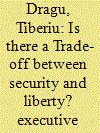

|
|
|
|
|
| Publication |
2011.
|
| Summary/Abstract |
I develop a game-theoretic model of an interaction between an antiterrorist agency and a terrorist organization to analyze how the probability of a terrorist attack varies when the level of privacy protections changes. I derive two implications. First, privacy and security from terrorism need not be in conflict: when accounting for strategic interactions, reducing privacy protections does not necessarily increase security from terrorism. Second, and more important, the antiterrorist agency will always want less privacy. The very agency whose expertise affords it disproportionate influence on policy making will prefer a reduction in privacy protections even when that reduction harms security from terrorism. The analysis has implications for understanding the relationship between government powers and civil liberties in the context of terrorism prevention and times of emergencies more generally.
|
|
|
|
|
|
|
|
|
|
|
|
|
|
|
|
| 8 |
ID:
105176
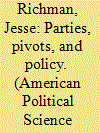

|
|
|
|
|
| Publication |
2011.
|
| Summary/Abstract |
Identifying policy status quo locations is a precondition for testing key predictions of many spatial models of legislative politics, but such measures have proved to be extremely difficult to construct. This study applies a novel technique that measures policy locations in relation to legislators' preferences. The resulting status quo estimates allow for a direct test of the policy consequences predicted by pivotal politics and party cartel theories of legislative politics. The empirical tests indicate that parties interact with pivotal politics to contribute to policy gridlock and shape policy change. By bringing pressure to bear on pivotal politics "pivots" and by blocking policy changes that would "roll" the party, parties increase the range of policies subject to gridlock in the American political system.
|
|
|
|
|
|
|
|
|
|
|
|
|
|
|
|
| 9 |
ID:
105172
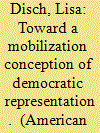

|
|
|
|
|
| Publication |
2011.
|
| Summary/Abstract |
This article analyzes what I term "the dilemma of democratic competence," which emerges when researchers find their expectations regarding democratic responsiveness to be in conflict with their findings regarding the context dependency of individual preferences. I attribute this dilemma to scholars' normative expectations, rather than to deficiencies of mass democratic politics. I propose a mobilization conception of political representation and develop a systemic understanding of reflexivity as the measure of its legitimacy. This article thus contributes to the emergent normative argument that political representation is intrinsic to democratic government, and links that claim to empirical research on political preference formation.
|
|
|
|
|
|
|
|
|
|
|
|
|
|
|
|
| 10 |
ID:
105168


|
|
|
|
|
| Publication |
2011.
|
| Summary/Abstract |
A salient feature of China's Great Leap Famine is that political radicalism varied enormously across provinces. Using excessive grain procurement as a pertinent measure, we find that such variations were patterned systematically on the political career incentives of Communist Party officials rather than the conventionally assumed ideology or personal idiosyncrasies. Political rank alone can explain 16.83% of the excess death rate: the excess procurement ratio of provinces governed by alternate members of the Central Committee was about 3% higher than in provinces governed by full members, or there was an approximate 1.11‰ increase in the excess death rate. The stronger career incentives of alternate members can be explained by the distinctly greater privileges, status, and power conferred only on the rank of full members of the Central Committee and the "entry barriers" to the Politburo that full members faced.
|
|
|
|
|
|
|
|
|
|
|
|
|
|
|
|
| 11 |
ID:
105173
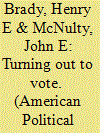

|
|
|
|
|
| Publication |
2011.
|
| Summary/Abstract |
Could changing the locations of polling places affect the outcome of an election by increasing the costs of voting for some and decreasing them for others? The consolidation of voting precincts in Los Angeles County during California's 2003 gubernatorial recall election provides a natural experiment for studying how changing polling places influences voter turnout. Overall turnout decreased by a substantial 1.85 percentage points: A drop in polling place turnout of 3.03 percentage points was partially offset by an increase in absentee voting of 1.18 percentage points. Both transportation and search costs caused these changes. Although there is no evidence that the Los Angeles Registrar of Voters changed more polling locations for those registered with one party than for those registered with another, the changing of polling places still had a small partisan effect because those registered as Democrats were more sensitive to changes in costs than those registered as Republicans. The effects were small enough to allay worries about significant electoral consequences in this instance (e.g., the partisan effect might be decisive in only about one in two hundred contested House elections), but large enough to make it possible for someone to affect outcomes by more extensive manipulation of polling place locations.
|
|
|
|
|
|
|
|
|
|
|
|
|
|
|
|
|
|
|
|
|